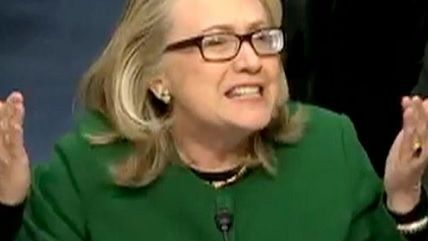Hillary Clinton, Democracy's Friend—and Foe
She likes democracy, when it breaks her way.

Hillary Clinton is a huge fan of democracy—just so long as it doesn't get in her way.
HRC—Her Royal Clintonness—has not driven a car in two decades. Her list of speaking-engagement demands includes special pillows onstage and hummus and crudités offstage (crudités is a fancy word for veggies). She has been paid more than a half-million dollars for speaking to the swells at Goldman Sachs.
But that doesn't mean she no longer cares about the little people! She does care. Deeply. We know this because she says so—and if there is anything Clinton is known for, it's always telling the straight-up truth.
In a recent column on CNN.com, Clinton recalls those glory days after the election of Barack Obama, when "Republicans faced a choice. (They) could either change themselves—by embracing the young, diverse and tolerant America of the 21st Century—or they could try to change whose voices count in our democracy. We all know the cynical path they chose."
Thanks to the Supreme Court ruling in Citizens United and other developments, she continues, "our democracy is being hollowed out. And that should offend every American, no matter what party you belong to." Too many special interests have too much power over elections, which makes it harder for "people with good ideas and a passion for public service" to run for elected office. "You shouldn't have to be rich or well-connected to serve."
On her campaign website, Clinton has a briefing paper on her "proposal to restore integrity to American elections." It says "revitalizing democracy" is "a key pillar of her campaign. She will fight to ensure that democracy works for everyday Americans and leads to government of, by, and for the people, not just the wealthy and the well-connected."
The trouble with the current system, the position paper says, is that it "creates disincentives for voters to feel like their participation matters and for candidates to focus more of their attention on regular voters." So Clinton wants to "restore the role of average voters in elections" and "revitalize our democracy so that it values the voices of everyday Americans, not just those at the top."
But she doesn't have to wait for the election to do those things. She could have done them long ago—by demanding that the Democratic Party eliminate superdelegates.
Superdelegates are Democratic Party big shots—current or former elected officials, members of the Democratic National Committee, and so on—who automatically get to attend the nominating convention. They offset the pledged delegates, who are chosen based on primary and caucus voting results. There are 712 superdelegates, and they make up nearly one-third of the convention votes needed to secure the nomination. (It takes 2,382 delegates at the national convention to become the nominee.)
And so far, Hillary Clinton has a lock on them.
In fact, as early as this past November—before a single vote had been cast—Clinton already had received so much superdelegate support that she had 15 percent of the total delegates needed to win the nomination.
Since then she has barely edged out Sanders in Iowa and lost badly to him in New Hampshire. And while she squeaked by him in Nevada, her lead in the delegate count has actually grown. As the AP recently reported, "after the contests in Iowa and New Hampshire, Sanders has a small 36-32 lead among delegates won in primaries and caucuses. But when superdelegates are included, Clinton leads 481-55." Sanders won New Hampshire by double digits, but six of its eight superdelegates support Clinton (the other two haven't announced who they're backing). Nevada added 19 delegates to the Clinton tally and 15 to Sanders'.
Sanders supporters are understandably cheesed off about this, and they have been voicing their displeasure—sometimes to superdelegates directly. And the supers are not impressed. "I'm sick and tired of them," says one superdelegate from Indiana.
To be clear, superdelegates have not signed blood oaths. They can switch their allegiance—and some do. When Clinton ran for president in 2008 a few dozen superdelegates who had supported her initially shifted to Barack Obama. But by then, Obama had mostly closed the superdelegate gap anyway.
Regardless, the Democratic Party's heavy reliance on superdelegates creates a two-tiered system in which the party elites—"those at the top," as Clinton puts it—have veto power over the wishes of the great unwashed masses. Clinton is counting on them to thwart the "young, diverse and tolerant Americans" who support her opponent. Sanders certainly has a "passion for public service"—and he promotes what many Democrats consider "good ideas"—but unlike Clinton, he is not "well-connected." So while he is winning the votes, he is losing the race.
To top it all off, Clinton and the Democratic Party apparatus have created a joint fundraising committee whose operations have enabled CLinton to "maximize donations from wealthy supporters," as The Washington Post notes. The New York Observer says this effort also "helps Clinton buy off superdelegates. . . . The Clinton campaign controls the money and decides which states receive it." New Hampshire's Democratic Party netted $124,000. No wonder its superdelegates support her.
To paraphrase Clinton, the question of superdelegates is a question of whose voices count in our democracy. And we all know the cynical path she's chosen.
This column originally appeared at the Richmond Times-Dispatch.


Show Comments (103)